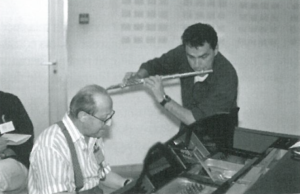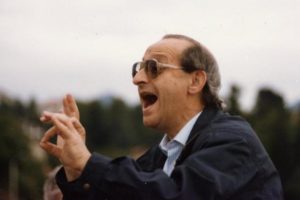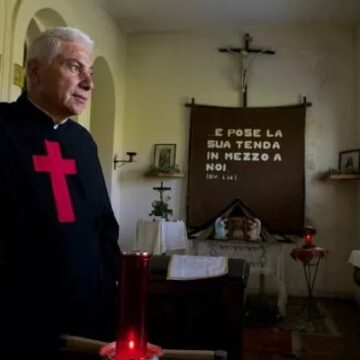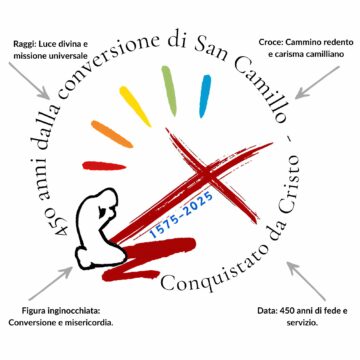 The photograph reproduced here was taken one afternoon at the end of August 2001 in Lyons, France. Giovanni Maria Rossi and I were rehearsing a piece that was then performed that evening within the framework of the activities organised for one of the international meetings of the ‘Univesa Laus’ Association for the study of music for the liturgy.
The photograph reproduced here was taken one afternoon at the end of August 2001 in Lyons, France. Giovanni Maria Rossi and I were rehearsing a piece that was then performed that evening within the framework of the activities organised for one of the international meetings of the ‘Univesa Laus’ Association for the study of music for the liturgy.
This is the last photograph of me with Giovanni that I took; we saw each other again after that event but unfortunately I do not have more recent photographs.
GMR was a musician, an organist, a singing master and the director of a choir. In each of these spheres he infused an exemplary education, always bringing the whole of himself. Many of those people who met him remember how much his direction of a choir was completely involving: not only did he guide the singing but he also drew it from deep areas, supported by an extraordinary capacity for establishing meaningful interpersonal relationships. And this was enormously reflected in his musical activity.
He always saw music as a gift to be shared; for him music and singing were an instrument by which to improve the quality of life of those who enjoyed them as performers or as members of an audience. For him, a priest, music, or to put it better, making music together, was in the ultimate analysis a gift of God to be shared with one’s neighbour, in an evangelical way. His drawing near to music therapy was inevitable on the pathway his life took. In such therapy, music is primarily at the service of the person, of quality of life, and of interpersonal relationships. He created centres and courses of music therapy in Assisi, Trento and Verona.
The first time that I met Giovanni Maria Rossi was in 1979 at a summer course of music at the Pro Civitate Christiana in Assisi. I knew him by name, as the composer of some of the most beautiful songs of liturgical music of the epoch. I knew about him because I had been in previous years a singing teacher for my brother who was five years older than me.
I knew him as a personality, a great figure of singing and music, but I immediately realised that his greatness lay in his ability to welcome the other – an adult professional or a first-year student – and to put him or her immediately at ease.
At that time I was a teenager and I was studying the violin at the musical school of Reggio Emilia.
My character and the upbringing that I had received had led me to grow up aware of my musical abilities with the organ, the violin and the flute, but I was shy, awkward, and from the point of view of my voice and singing I had the belief that I was not good like the others with whom I played regularly; indeed I thought I was rather stone deaf, that I did not have a very good ear.
Life had led me to become a singing teacher, a musician and a teacher of English and the teaching of foreign languages. As an expert in languages I gave lessons and lectures in Italy and abroad in front of large audiences, at times hundreds of people. If I manage to engage the audience this is something that I owe primarily to the pathway that I then began with Giovanni Maria Rossi and continued for over a decade, first studying with him and then working with him as a singing teacher. He taught to me to ‘feel’ that I sang in tune, to accept my voice and to work starting with it as it was and not as more or less I would have consciously wanted it. In practice, he taught me to accept myself, to like myself.
I remember as a student the evenings, at times the nights, spent with him talking, bringing out the most intimate things of my heart.
I felt that I could do this in particular with him. Why was this?
Only later did I understand that in working on my voice he was working on my personality, making it aware of its potentialities. In reality, in freeing up the potentialities of my voice, he freed up those of my personality.
I emphasise this aspect in order to point implicitly to one of the points of arrival of his work: Giovanni Maria Rossi helped me to accept my voice, to improve it, and, at the same time, to accept and improve the personality that was behind that voice. I experienced within me an intimate, extraordinary and fascinating pathway of music therapy on which Giovanni Maria Rossi was certainly present but never invasive; indeed he was always respectful and to the point in all his attitudes.
Over the years I was often a student of his specialisation courses and worked with him as a teacher of basic courses.
Today I believe that I am a person who is better than I was then, a person who knows how to accept himself and other people, who knows how to like himself and others in a disinterested way: all of this I owe above all to him and to the work that he did with my voice, ensuring that I took my life into my own hands. From him I learnt personally that to work on a voice is to work on a person.
From him I learnt first of all to listen and to listen to myself, on a pathway of growth that began then and which was destined to last the rest of my life.
If we learn to listen to the signals that our bodies send to us, we learn to live in health. When we are really disposed to change habits, even those that are rooted in us, when listening to our bodies and our most hidden selves lead us to do this, we can be certain that we have ahead of us a more peaceful life and more health. If we learn to listen to the other person and to give him or her our disinterested, free and total listening which is without prejudices, we will have constructed ties able to resist the wear of time and habit: in listening to ourselves we are new every day; in listening to the other we discover the newness that he or she has to tell us, constantly.
 One of the ways of learning to listening to ourselves, Rossi argued, is to learn to sing. In order to improve our singing we must grow on the pathway of listening. There is an extraordinarily rich bi-univocal correspondence between singing and listening to oneself.
One of the ways of learning to listening to ourselves, Rossi argued, is to learn to sing. In order to improve our singing we must grow on the pathway of listening. There is an extraordinarily rich bi-univocal correspondence between singing and listening to oneself.
“To sing in tune one must know how to listen” Giovanni Maria Rossi often said and in this he took up principles that were the fruit of study and personal development that the French medical doctor and phoniatrician Alfred Tomatis (1920-2000) had been codifying and disseminating for some years.
In 1991, together with Giovanni Maria Rossi, I took part in Innsbruck in the international meeting of Universa Laus and on that occasion I listened to a paper given by a person who worked with Dr. Tomatis. I immediately connected what I heard from that distinguished speaker to what Giovanni Maria Rossi, who was present in the hall, had been teaching for years, and there was a great deal of affinity. This was a moment of great enthusiasm; elements of a scientific, neurological, psycho-relational, musical and spiritual character converged towards a point that was apparently simple but which in reality was rich in a large number of implications: to improve the dimension of listening is to improve quality of life, or put with more simplicity: everything starts from listening – quality of life, our quality of life and that of those who are near to us. Everything starts from listening and singing fosters listening. How much importance singing has in our personal wellbeing!
A great deal of time has passed since then: many studies, many experiences, much life, but the beliefs that matured in me at the beginning of the 1990s have never been put to one side; if anything, they have been strengthened by reading, personal experiences and by other musicians who are colleagues of mine and singers with whom I have been able to engage in dialogue.
In June of last year I was awarded a Ph.D. in music therapy by a prestigious Anglo-Saxon university. This was another piece in a journey of growth that began with Giovanni Maria Rossi and has not yet finished, given that I am aware that this is a journey destined to last all of my life and one able to generate increasing enthusiasm.
If today I feel that I am a better person, this is something that I owe to this very rich person as well, to the studies that he gave me to follow, to the example that he set me, to his listening that was his gift to me.
I feel that it is my moral obligation in my own small way to be able to be of help to other people in the way that he was of help to me.











Camillians on Facebook
Camillians on Twitter
Camillians on Instagram